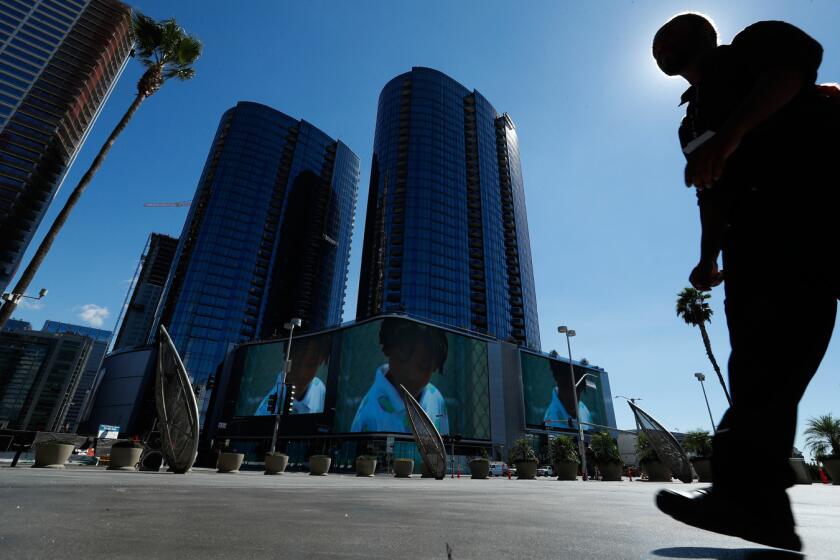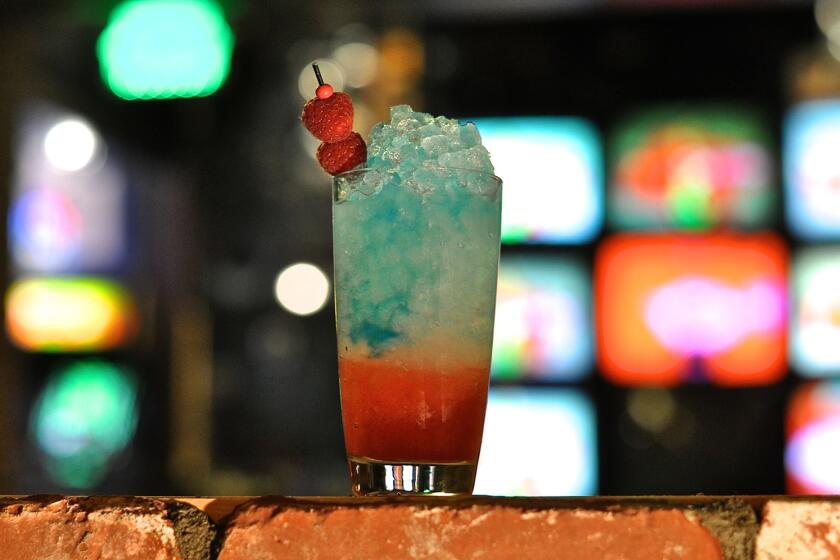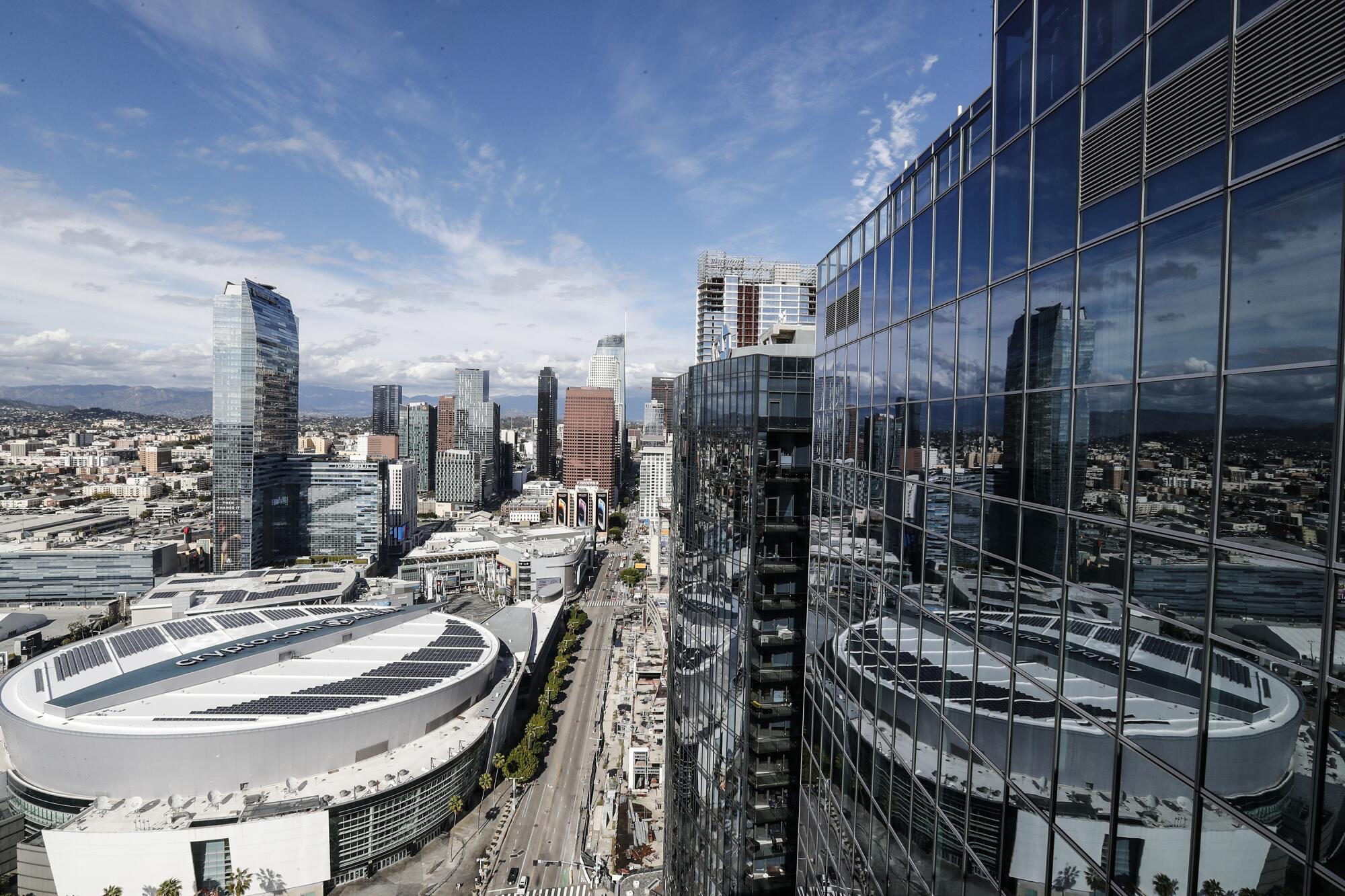
A high-rise with two hotels and an over-the-top restaurant and bar scene is set to open this month by Crypto.com Arena in downtown Los Angeles as travelers embrace the road again and the hospitality business climbs out of the crater it sunk into during the pandemic.
The builders hope that events at the arena and the adjacent Los Angeles Convention Center will drive overnight business to the hotels and help tempt locals to cavort in the 12 bars, restaurants and clubs that will be a prime feature of the Moxy and AC complex at Figueroa Street and Pico Boulevard.
Moxy and AC are hotel brands operated by Marriott International, which is already the biggest hotelier in the neighborhood with the JW Marriott and Ritz-Carlton at L.A. Live as well as an adjacent tower containing both Courtyard and Residence Inn hotels.
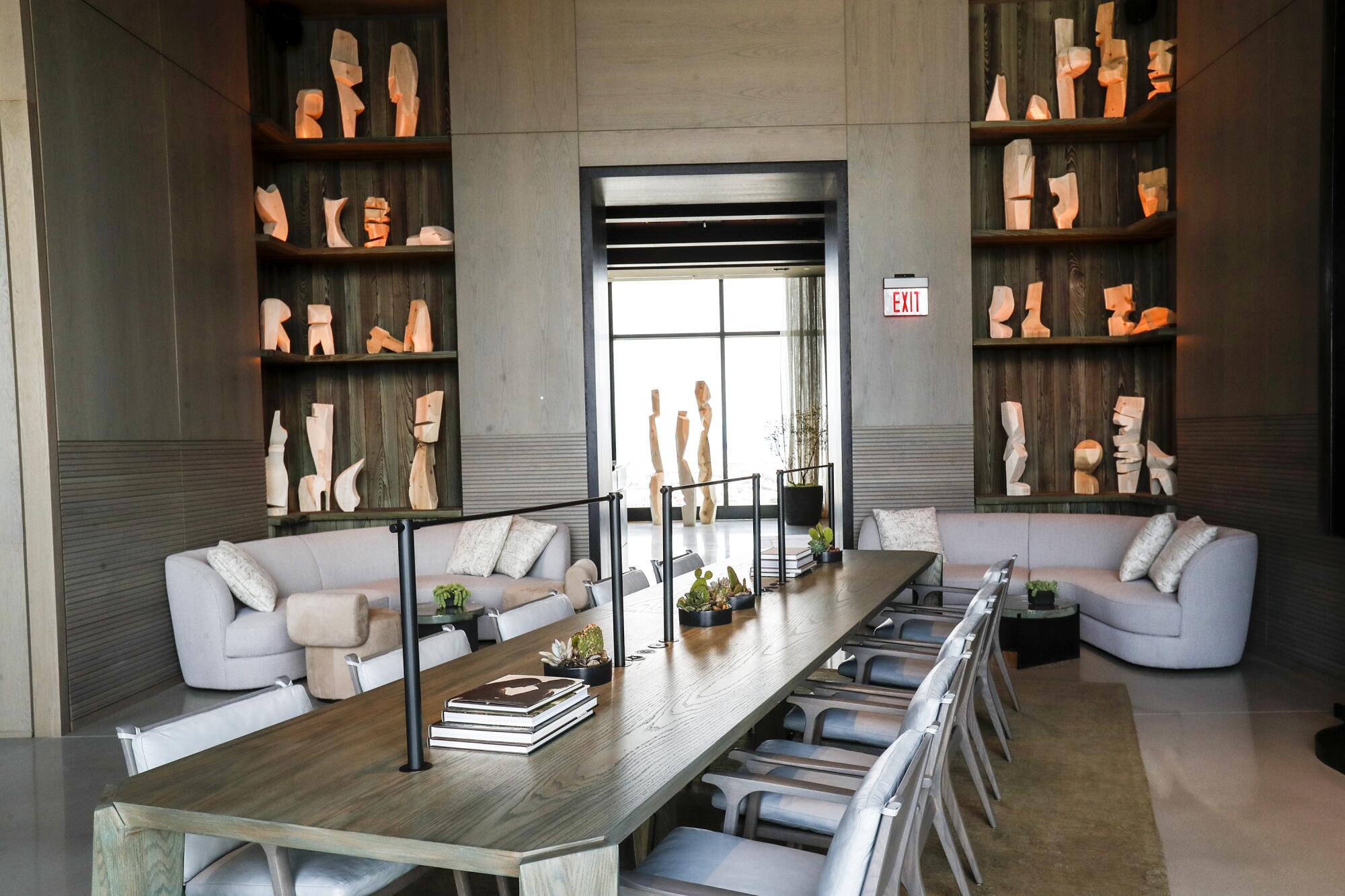
Marriott put multiple brands in downtown L.A. to serve a range of reasons people travel such as leisure, business and conferences, said Chief Executive Anthony Capuano. With the new hotels, Marriott will manage 3,200 rooms in six inns.
The hostelries are part of billions of dollars of development that has transformed the once-blighted South Park neighborhood, starting with the completion of then-Staples Center in 1999 and followed by the L.A. Live hotel, office and entertainment center in 2007 that anchored a wave of investment.
“The L.A. Live complex transformed the urban core of the city,” said Capuano, who had a key role in putting Marriott hotels there. “Downtown used to be pretty sleepy after about 5 p.m.”
Part of a long block that last held a parking lot and a Hooters restaurant is now home to the new skyscraper run by Marriott. Next door is the high-rise luxury apartment complex Circa.
Even in a time of roaring apartment construction in Los Angeles, the new Circa complex downtown is hard to miss.
Among Marriott’s newest brands is Moxy, which is cheeky like its name and intended to appeal to younger guests seeking a good time and a lower price point — rooms are small by American standards. AC has a Spanish heritage and is pitched to older guests who prefer a more refined European sensibility.
Moxy hotels are meant to be “irreverent and fun,” said real estate developer Mitchell Hochberg, president of Lightstone Group. His company built the L.A. complex as well as Moxy hotels in New York and Miami Beach.
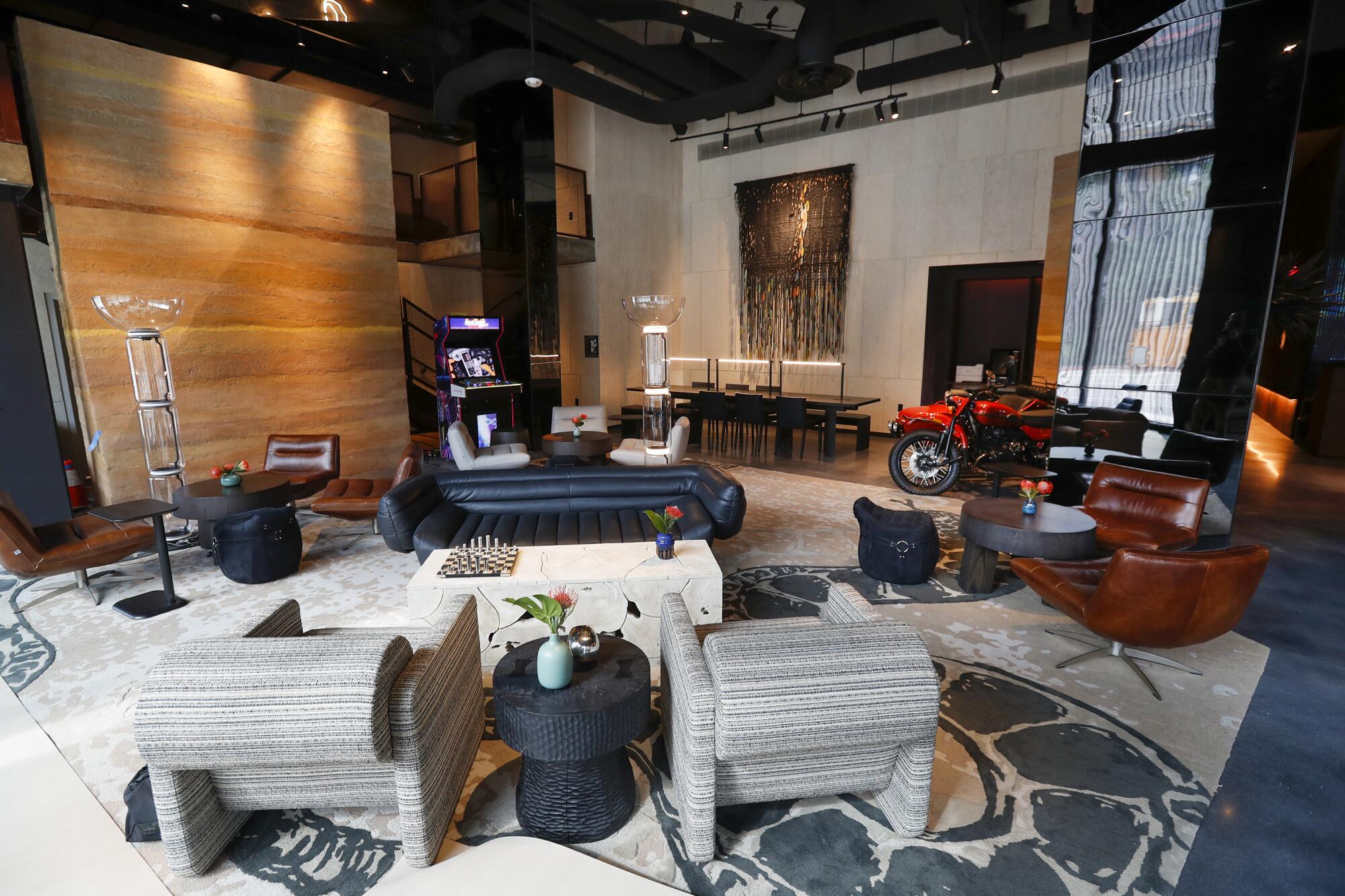
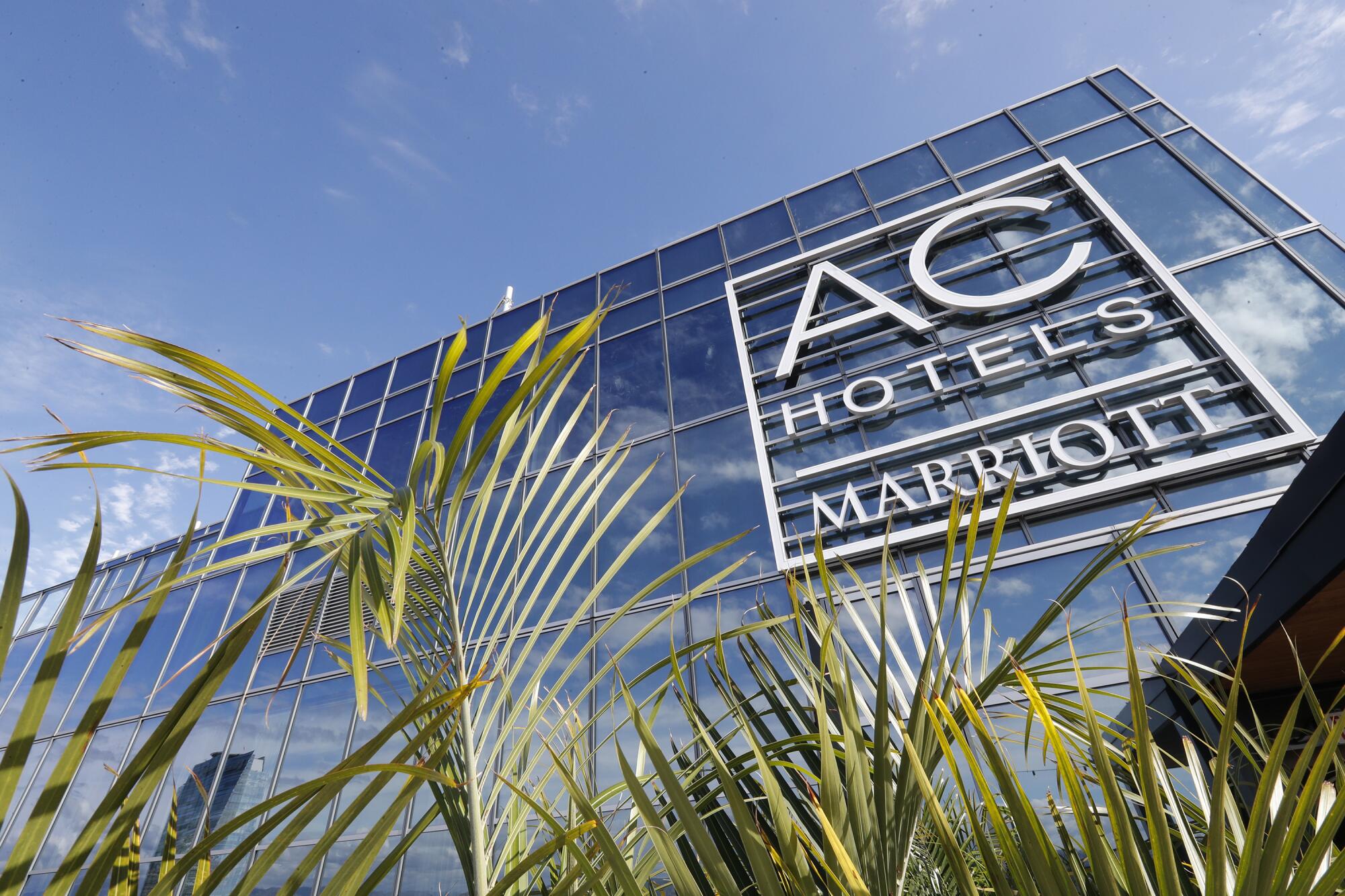
“A lot of hotels are too precious,” said Hochberg, who was sitting back in a soft chair in the Moxy L.A. lobby with his boots on the table in front of him. “And too much alike.”
The lobby, where guests can check in at the bar, is intended to have a casual, living-room atmosphere. The theme and color palette is “desert nomad,” with macrame art, a rammed-earth wall and a motorcycle with a sidecar to bring the point home. A vintage pinball machine is tucked in an upstairs balcony.
There are scattered wooden work stations where guests or visitors can plop down and be or at least act productive. Hochberg hopes local residents will be among the people hanging out.
“We want neighbors too,” he said, so “guests can experience the city they are in” and not just meet fellow travelers. About half the people hanging out or working in the lobby of a Moxy in New York are not staying there, he said.
The attention-grabbing attraction for travelers and locals alike will be Level 8, a spread of eating and drinking venues that cover the entire eighth floor of both hotels — the Moxy and AC are stacked vertically side-by-side in a 37-story tower designed by architecture firm Gensler. The exterior is clad in a 15,000-square-foot electronic billboard, one of the largest in the West capable of projecting a 3-D effect.
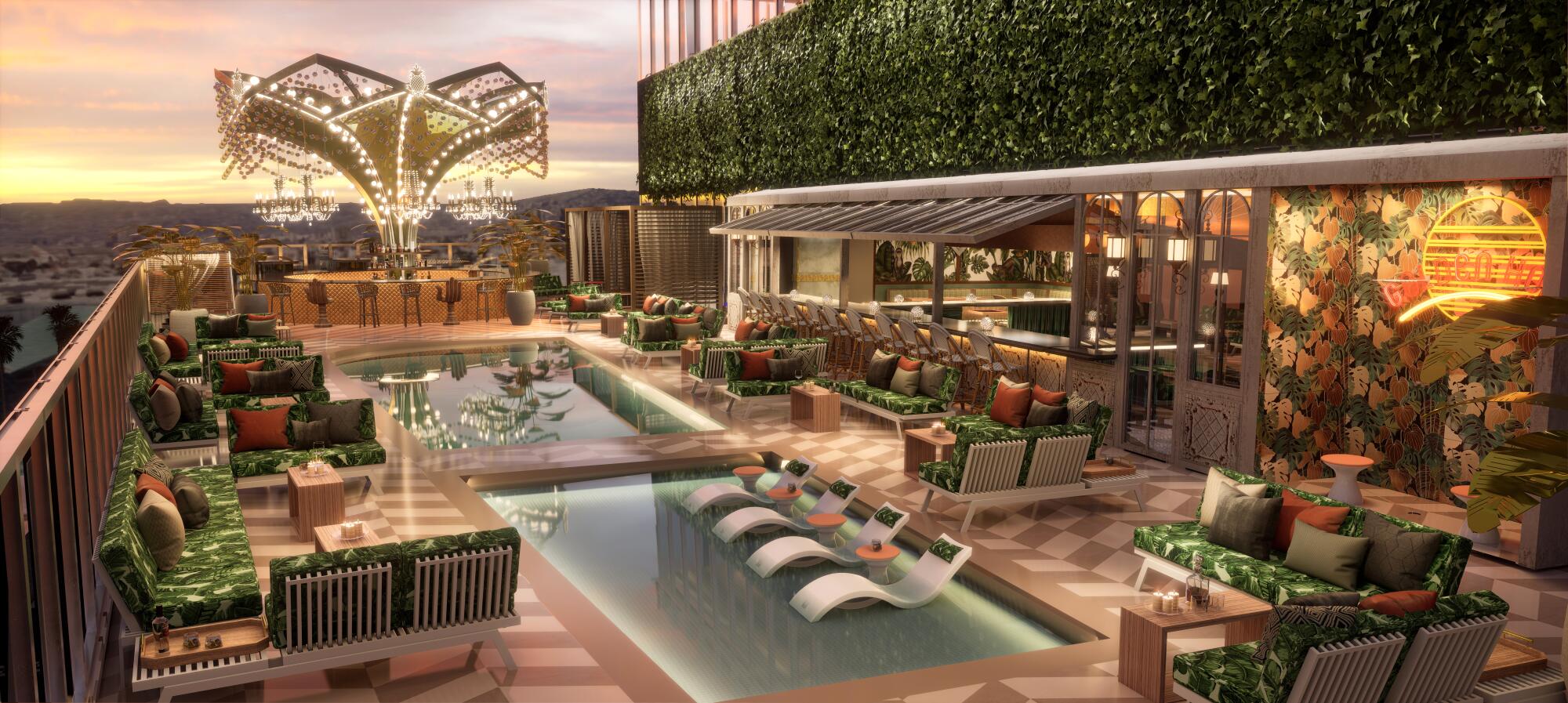
Prolific L.A. bar and restaurant operators Mark and Jonnie Houston, known for creating playful and theatrical settings to eat and drink, are trying on Level 8 to notch a new high in the zaniness and rakish decadence they are known for.
Among their earlier attention-grabbers are Good Times at Davey Wayne’s, a 1970s-themed speakeasy in Hollywood entered through a refrigerator and Kiss Kiss Bang Bang, a Koreatown nightclub that combines Art Deco with disco. Their Parisian cocktail lounge Pour Vous had burlesque dancers.
Mark and Jonnie Houston, the brothers behind Houston Hospitality, have created a ‘70s basement lounge, a rum and cigar lounge, a Victorian mansion turned ‘20s glam party house, and now, with Break Room 86, their newest venue, an ‘80s-themed bar with karaoke.
“We have never tackled anything of this magnitude,” Jonnie Houston said of Level 8, which will span 30,000 square feet and have eight distinct venues including dining, cocktail bars, a pool deck and a nightclub.
Japanese-inspired restaurant Lucky Mizu will be centered around and under an “earth harp,” a giant musical instrument with strings that stretch over the audience. Guests will cook traditional hot pot cuisine and steamed seiro mushi entrees at their tables. Another will serve Japanese teppanyaki, where chefs cook flamboyantly on huge griddles. Masked Mexican-style wrestlers will perform in a ring at Sinners y Santos.
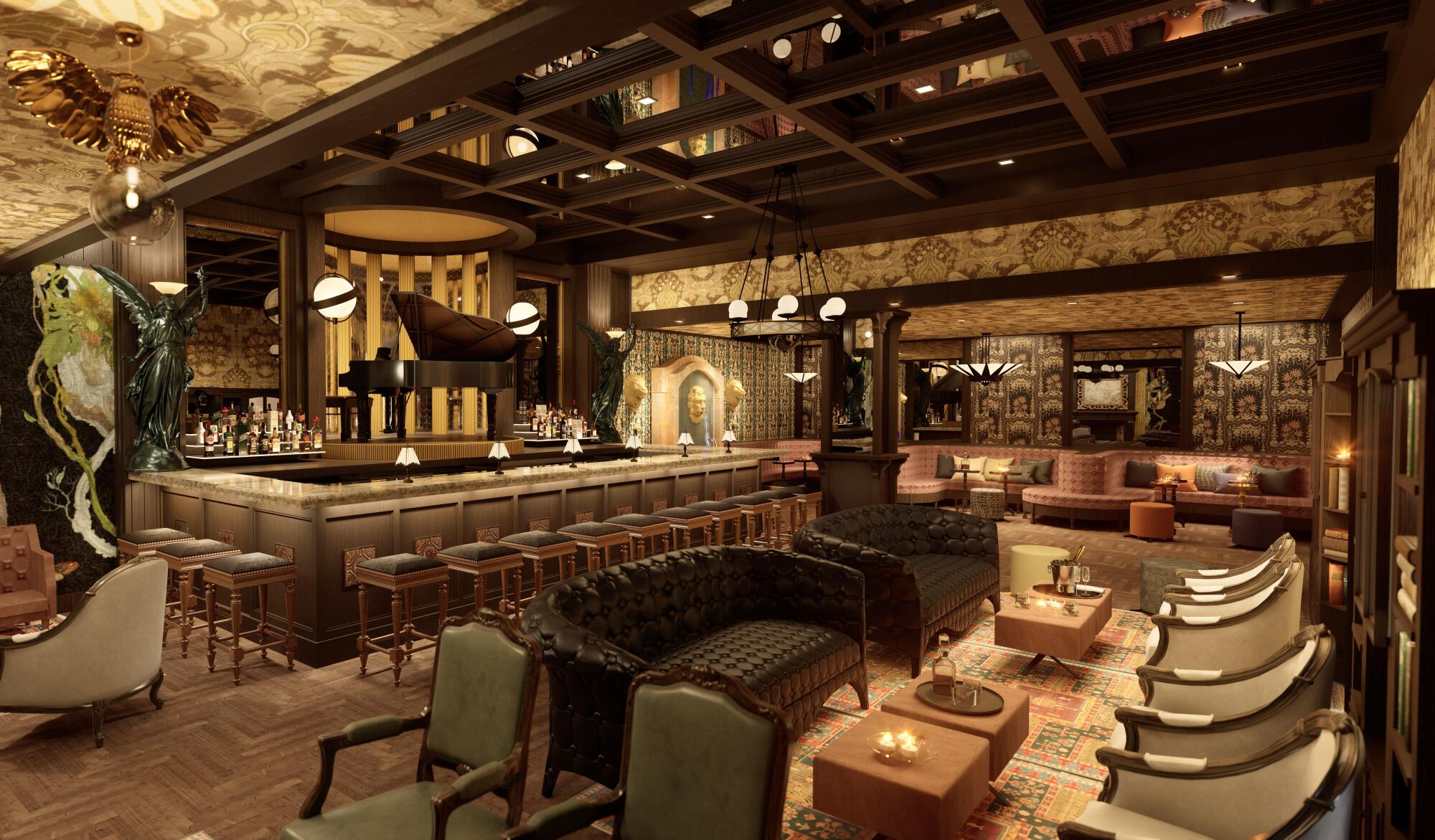
A speakeasy bar will be entered through what appears to be an old cathedral. The pool deck is expected to have a Miami flavor capped with an outdoor bar under a rotating carousel.
Mark Houston said he got goose bumps looking up at the “massive” spinning carousel on the corner of Figueroa and Pico. Perhaps, he said, “It made me feel like how Walt Disney probably felt seeing Disneyland being built.”
It’s been a hard slog, though, to meet all the safety, health and design requirements of building complicated bars and restaurants far above the street.
“I realized why high-rises are so cookie cutter,” Mark Houston said. “It’s because you deal with so many hurdles that everyone just gives up.”
It will take longer to complete Level 8 than the Moxy and AC, which are set to open April 12. The Houstons’ complex should be open by the end of June.
If the result is as hoped, the Houstons will oversee an attraction that will inspire return visits because, he said, “You can’t do it all in one night.”
Ideally for the Houstons and hoteliers, Southern California residents might even decide to turn downtown visits into staycations that last a couple of nights because they are entertained, he said.
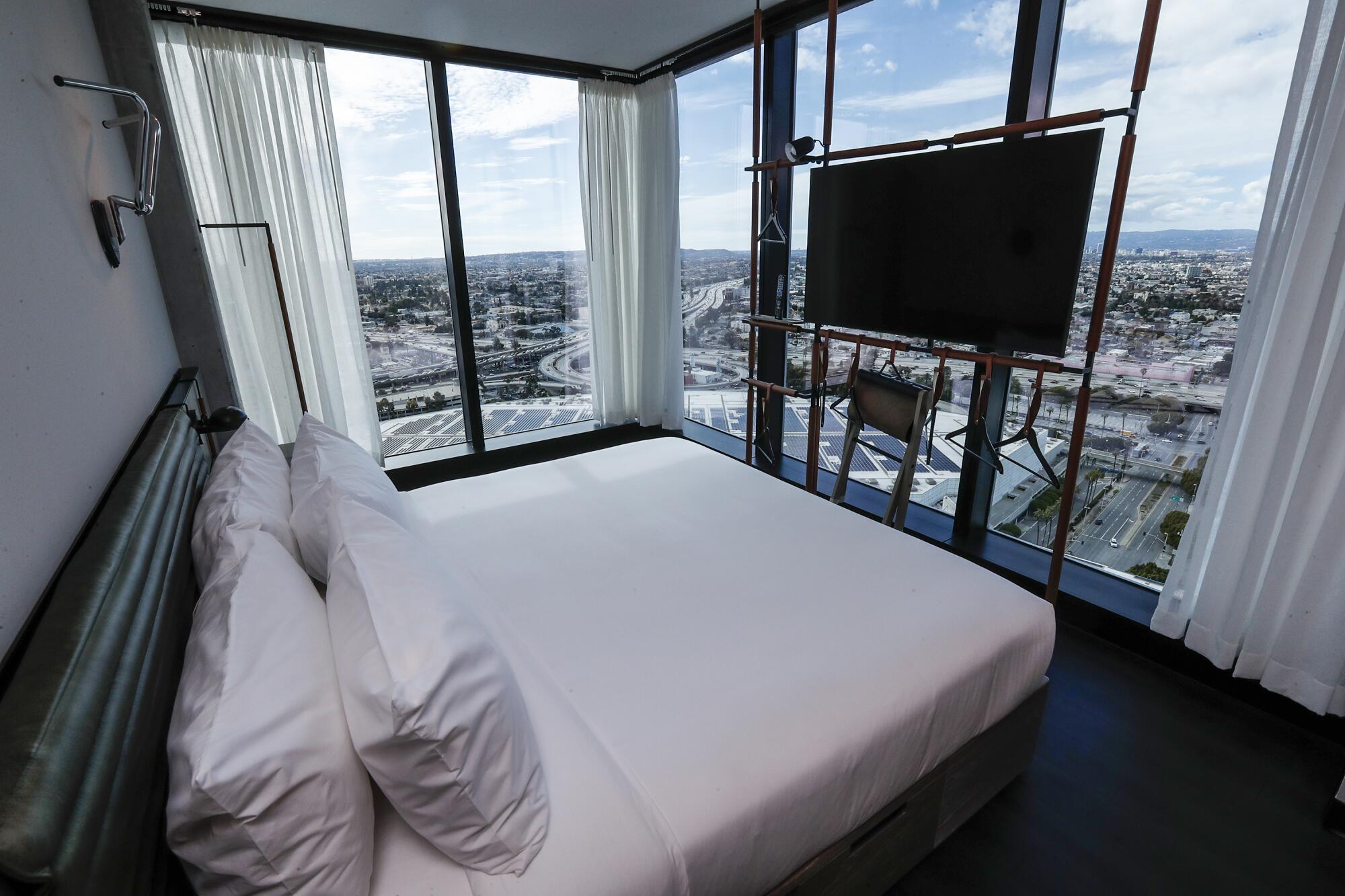
Moxy’s good-time vibe may help it stand out from the competition, said Donald Wise, a hotel investment banker at Turnbull Capital Group who is not involved in the project.
“It’s all about differentiation,” he said. “You’re trying to differentiate your box from the box down the street.”
Moxy’s design flourishes such as the motorcycle in the lobby and the Houstons’ sky-high adult playground should tee up tempting backgrounds for people to tout their visits on social media, Wise said.
For many, “Your hotel has to be Instagrammable,” he said. “People pick a place to honeymoon or have a vacation or staycation because it’s Instagrammable.”
The hotel business has seen a substantial recovery since the depths of the pandemic in 2020, industry consultant Alan Reay of Atlas Hospitality said. Leading the way have been travelers eager to kick back at airy resorts.
Coastal inns and hotels in other leisure destinations such as the Coachella Valley “are enjoying record revenues post-COVID,” he said.
Hotels in California urban centers such as San Francisco, San Jose and downtown Los Angeles have also recovered but are still lagging behind their 2019 peaks, he said. Such markets are more reliant on business travelers and conventioneers, who have yet to return in full force.
Conventions are coming back “slowly but surely,” but the pipeline of events that was shut off during the pandemic has yet to fully refill, he said. “You don’t just flip a switch and put a convention on.”
Conventions and group business events will continue to grow, he predicted, as business people seek opportunities for face-to-face meetings that have grown less easy to arrange as offices empty in favor of remote work.
Average hotel occupancy in downtown L.A. last year was 71%, a solid rise from 60% in 2021, Reay said. The average price of renting a room went from $210 per night to $265. Rooms at the Moxy will start at $199 and a night at the AC will begin at $219.
But even though room rates have bounced back to prepandemic levels, hoteliers are facing inflation and higher costs than they had before, especially labor, Reay said.
Los Angeles is experiencing the eighth-slowest recovery of all major markets in the United States in terms of gross operating profit per available room, according to a report by the American Hotel & Lodging Assn. The trade group predicted the region will continue a slow recovery from the COVID-19 pandemic while the hospitality industry’s performance nationwide surpasses 2019 levels.
“Overall, the hotel business is very robust right now,” Wise said.
Marriott, Capuano said, is “cautiously bullish” on downtown Los Angeles.
“There are some challenges that need to be overcome around homelessness and crime,” he said. “We want to be part of those solutions” in part by working with the mayor’s office, Los Angeles Tourism and Convention Board and other civic leaders.
Capuano lived in Southern California for 15 years, he said, “so I’ve got a vested interest in seeing the city continue to grow and thrive.”
More to Read
Sign up for Essential California
The most important California stories and recommendations in your inbox every morning.
You may occasionally receive promotional content from the Los Angeles Times.
